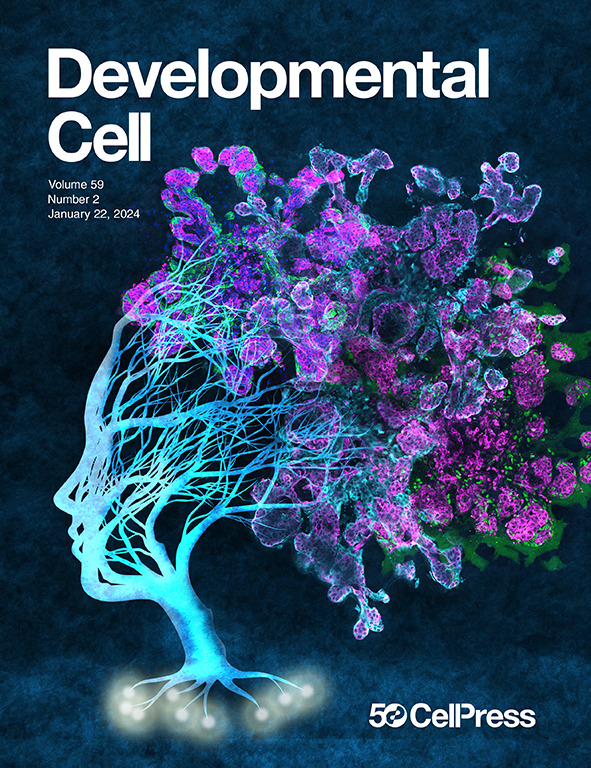谷氨酰胺结合HSC70转导信号抑制IFN-β介导的免疫原性细胞死亡
IF 10.7
1区 生物学
Q1 CELL BIOLOGY
引用次数: 0
摘要
谷氨酰胺在调节基因表达和影响肿瘤发生的细胞信号传导中发挥作用。然而,目前尚不清楚谷氨酰胺如何在细胞中转导信号。在这里,我们发现谷氨酰胺与热休克同源蛋白70 (HSC70)结合,独立于已知的谷氨酰胺代谢或信号传导途径刺激含有脱泛素酶otubain结构域的蛋白(OTUD4),通过微自噬-溶酶体途径稳定乳酸脱氢酶A (LDHA),增加乳酸生成,降低干扰素(IFN)-β及其靶点的表达,这是免疫原性细胞死亡(ICD)的标志。在癌细胞系和患者来源的类器官和异种移植物中,谷氨酰胺耗损或谷氨酰胺转运抑制联合icd诱导的化疗药物协同激活IFN-β,促进CD8+ T细胞募集,并通过OTUD4/LDHA轴抑制癌细胞生长。肿瘤患者中CD8表达与谷氨酰胺转运蛋白丙氨酸/丝氨酸/半胱氨酸转运蛋白2 (ASCT2)、OTUD4和LDHA表达呈负相关。因此,我们确定了细胞内谷氨酰胺信号通路,并且靶向该通路是一种有希望的癌症治疗策略。本文章由计算机程序翻译,如有差异,请以英文原文为准。

Glutamine binds HSC70 to transduce signals inhibiting IFN-β-mediated immunogenic cell death
Glutamine plays a role in cell signaling that regulates gene expression and impacts tumorigenesis. However, it is still unclear how glutamine transduces signals in cells. Here, we show that glutamine binds to heat shock cognate protein 70 (HSC70) to stimulate the deubiquitinase otubain domain containing protein (OTUD4) independently of known glutamine metabolic or signaling pathways, resulting in lactate dehydrogenase A (LDHA) stabilization via the microautophagy-lysosome pathway, increased lactate production and decreased expression of interferon (IFN)-β and its targets, hallmarks of immunogenic cell death (ICD). In cancer cell lines and patient-derived organoids and xenografts, glutamine depletion or glutamine transport inhibition combined with ICD-inducing chemotherapeutic drugs synergistically activates IFN-β, promotes CD8+ T cell recruitment, and inhibits cancer cell growth via the OTUD4/LDHA axis. CD8 expression is negatively correlated with expression of the glutamine transporter alanine/serine/cysteine transporter 2 (ASCT2), OTUD4, and LDHA in cancer patients. Thus, we identify an intracellular glutamine signaling pathway, and targeting this pathway is a promising strategy for cancer treatment.
求助全文
通过发布文献求助,成功后即可免费获取论文全文。
去求助
来源期刊

Developmental cell
生物-发育生物学
CiteScore
18.90
自引率
1.70%
发文量
203
审稿时长
3-6 weeks
期刊介绍:
Developmental Cell, established in 2001, is a comprehensive journal that explores a wide range of topics in cell and developmental biology. Our publication encompasses work across various disciplines within biology, with a particular emphasis on investigating the intersections between cell biology, developmental biology, and other related fields. Our primary objective is to present research conducted through a cell biological perspective, addressing the essential mechanisms governing cell function, cellular interactions, and responses to the environment. Moreover, we focus on understanding the collective behavior of cells, culminating in the formation of tissues, organs, and whole organisms, while also investigating the consequences of any malfunctions in these intricate processes.
 求助内容:
求助内容: 应助结果提醒方式:
应助结果提醒方式:


